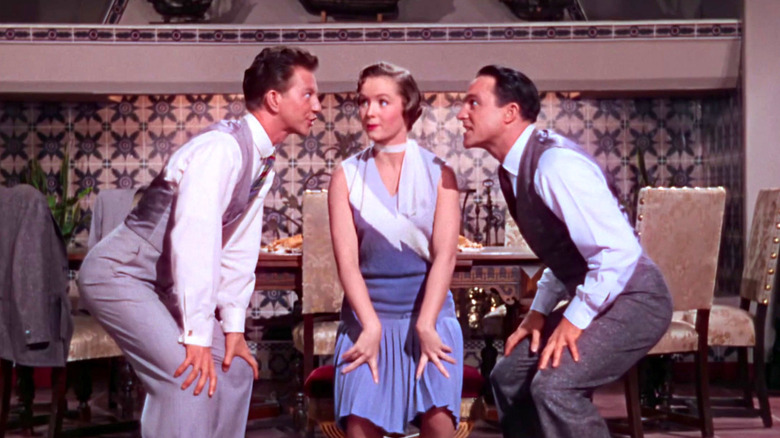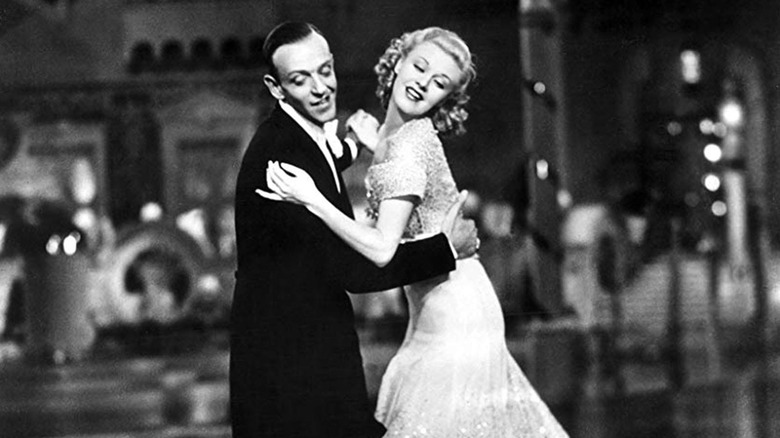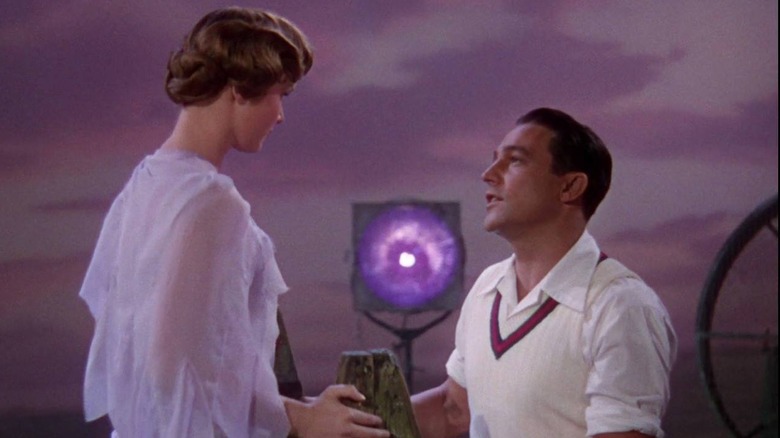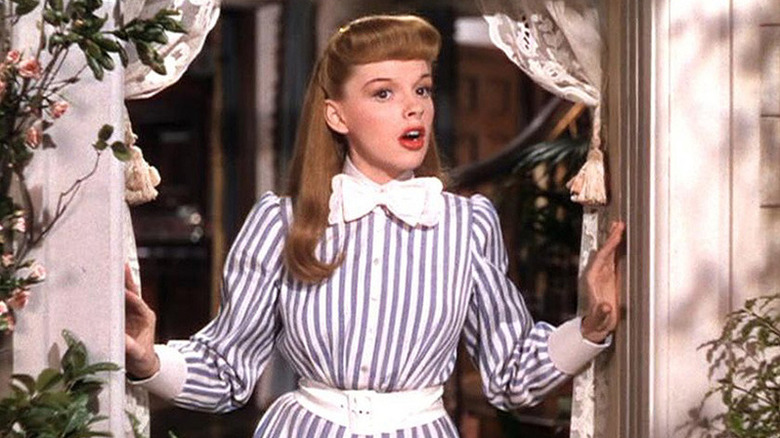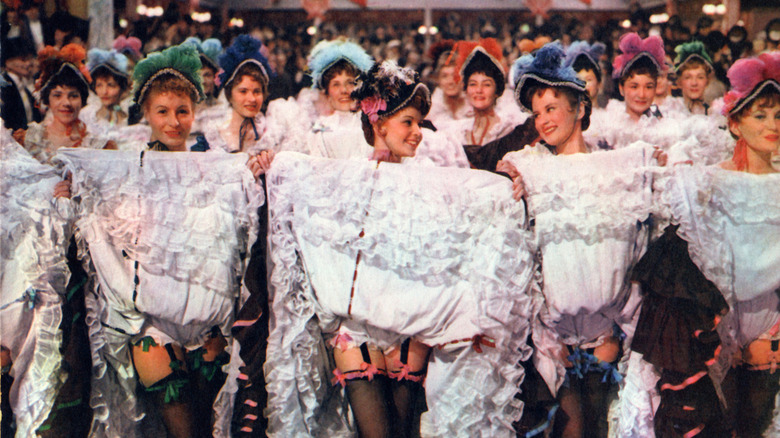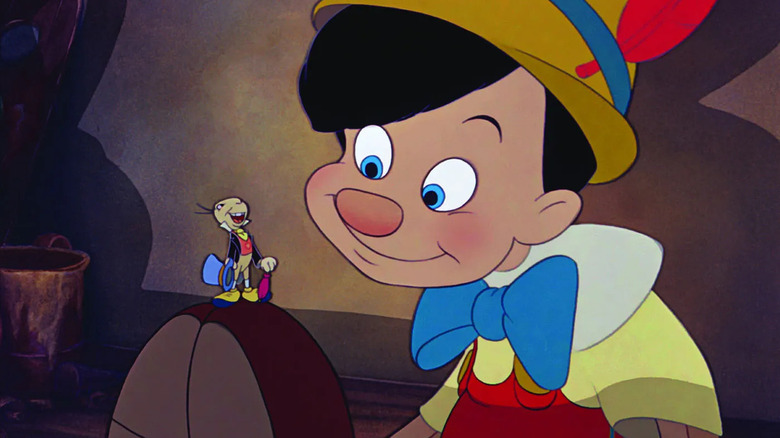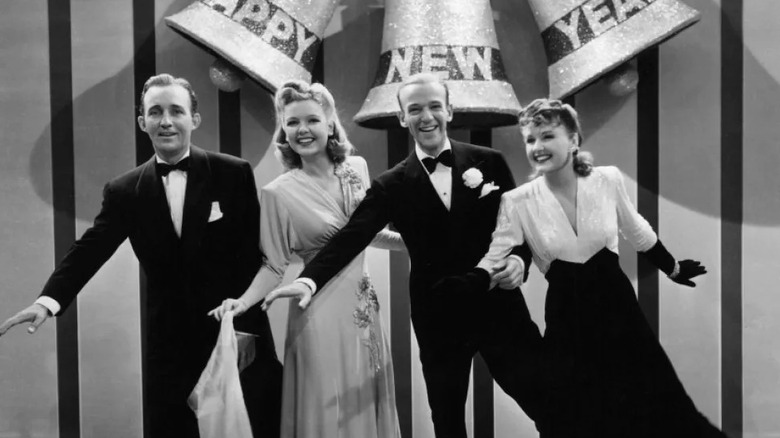There Are Only Six Perfect Musicals, According To Rotten Tomatoes
As a genre, movie musicals have had some serious ups and downs throughout Hollywood history (and the specifics of that are pretty fascinating, but I'll go ahead and give Lindsay Ellis' video essay about that very topic a shout-out instead of poorly getting into the weeds of it myself). Right now, they definitely seem to be on an upswing, especially now that the long-awaited "Wicked" movie blew everyone away at the box office — and it was only the first half of the musical to boot.
In recent years, movie musicals like "Wonka," "Mean Girls," "The Greatest Showman," "La La Land," and even the filmed stage version of "Hamilton" have become enormous hits, though critical reception has been decidedly mixed across these projects. So what are the best musicals ever according to the official Rotten Tomatoes ranking of movie musicals? Only six musicals earned 100% ratings on the review aggregate, which is — I have to say — a little surprising, largely because some all-time classics apparently missed the cut. For example, "The Sound of Music" and the original "West Side Story" only earned 83% and 92%, respectively, despite being two staples of the genre, and other beloved movie musicals like "The Umbrellas of Cherbourg," "Mary Poppins," "The Wizard of Oz," and Judy Garland's version of "A Star is Born" all fell below 100% as well. Still, we're here to celebrate the six movie musicals that critics think are the best of the best. Let's take a look.
Top Hat (1935)
You can't talk about great movie musicals without mentioning two of the genre's most iconic figures: Fred Astaire and Ginger Rogers. The duo appeared in ten movie musicals together, including "Swing Time" and "Shall We Dance," but their most critically acclaimed collaboration is still their 1935 film "Top Hat," which features original music by Irving Berlin (including now-classic songs like "Top Hat, White Tie and Tails" and "Cheek to Cheek"). So what is "Top Hat" about, for the uninitiated?
The film stars Astaire as an American tap dancer named Jerry Travers who heads to London to perform in a show for Horace Hardwick (Edward Everett Horton), a somewhat inept producer. While he's working on his routine, he meets Dale Tremont (Rogers), and by "meets," I mean she's staying directly underneath his hotel room and is understandably furious about the noise he's making. Jerry immediately falls for Dale and chases her around town before the two decamp to Venice ... and throughout it all, there's a case of mistaken identity that causes some very amusing issues between the two. "Top Hat" is a charming, silly romp starring two of the best dancers Hollywood's ever seen, so it's not really a huge surprise that it has a perfect Rotten Tomatoes score — and if you missed this Astaire-Rogers film, you'll want to check it out as soon as possible.
Singin' in the Rain
I'm going to go out on a limb here and say that the 1952 musical comedy "Singin' in the Rain" isn't just a perfect movie musical, but a perfect movie, period. (Seriously, watch it or rewatch it if it's been a while: not only are the jokes as sharp as ever, none of them will make you cringe because they wouldn't fly today.) Co-directed by star Gene Kelly and the legendary director Stanley Donen — the latter of whom also helmed famous movie musicals like "Funny Face" — "Singin' in the Rain" takes place in 1920s Hollywood, where the age of the silent film appears to be ending and "talkies" are on the rise, much to the chagrin of the film's fictional movie stars.
Kelly leads the pack as Don Lockwood, a Hollywood heartthrob who makes blockbuster silent films with his on-screen partner and rumored paramour Lina Lamont (Jean Hagen), but what their fans don't know is that the two absolutely despise one another. With talking pictures becoming the norm in the industry — within the universe of the movie, Don and the executives around him name-drop the real talkie "The Jazz Singer," the first-ever feature length talking picture — Don and Lina try to make the switch in their film "The Dueling Cavalier," but sound issues and Lina's squawking voice threaten to derail the entire endeavor. Luckily, Don's best friend Cosmo Brown (Donald O'Connor) has a brilliant idea: what if the movie changed its title to "The Dancing Cavalier" and Lina's voice is dubbed over by aspiring and actress Kathy Selden (Debbie Reynolds), who meets Don by chance while attending a huge Hollywood party?
Everything about "Singin' in the Rain" is brilliant and sets the standard for all movie musicals, from classic songs like the title track and "Good Morning" to the incredible dance sequences performed by Kelly, O'Connor, and Reynolds. (Hagen, the funniest part of an already funny movie, also deserves her flowers.) It's no surprise that this movie has a perfect Rotten Tomatoes rating; it deserves it. (Plus, we have this movie to thank for "I'm Just Ken" from "Barbie.")
Meet Me In St. Louis
Between "The Wizard of Oz," her version of "A Star is Born," and the 1944 movie musical that earned 100% on Rotten Tomatoes — "Meet Me in St. Louis" — Judy Garland is basically the queen of movie musicals, which is probably why that last one remains so highly regarded. Directed by Vincente Minnelli (to whom Garland was married from 1945 to 1951 after they met on set), the movie spends a year from 1903 to 1904 with the Smith family, who live in St. Louis and are preparing for the Louisiana Purchase Exposition, also called the first World's Fair, which takes place in the spring of 1904. As Esther Smith — the second-eldest daughter of Alonzo (Leon Ames) and Anna (Mary Astor) — Garland shines as a young girl in love with the Smith family's neighbor John Truett (Tom Drake), who ends up in conflict with them after she's told that John attacked her younger sister Tootie (Margaret O'Brien). (Thankfully, Tootie and Agnes, the fourth and final Smith daughter played by Joan Carroll, reveal that their accusation isn't true, and John and Esther reconnect.) Alongside Esther's romantic troubles, she and her sisters are grappling with the fact that they'll be moving to New York for their father's job, and Rose is head over heels in love with the handsome bachelor Warren Sheffield (Robert Sully).
Everything works out for the Smiths in the end, and the journey itself is completely delightful; just try watching "The Trolley Song" and not getting it stuck in your head. Plus, you might not know that the song "Have Yourself a Merry Little Christmas" came from this film thanks to songwriters Hugh Martin and Ralph Blane, even though Garland's version of the holiday tune eventually got knocked out of the spotlight by Frank Sinatra's cover.
Movie musicals are a true delight — when they're done well — and you won't be disappointed by any of these three, so whether you're a former musical theater kid or a newcomer to the genre, start with these and you can't go wrong.
French Cancan (1956)
Set in Paris in the 1880s, Jean Renoir's 1956 film "French Cancan" centers around a (fictional) nightclub in the French capitol called Le Paravent Chinois, owned by Henri "Zizi" Danglard (Jean Gabin). Henri's mistress Lola de Castro (María Félix) is the club's main attraction, but when Henri discovers a young, beautiful cancan dancer named Nini (Françoise Arnoul), he's enamored with her ... and sells Le Paravent Chinois. Henri then buys La Reine Blanche, the Montmartre dance hall where he first saw Nini perform, and tears it down, intending to rebuild a grand hall dedicated to cancan. (Specifically, he wants to turn it into the very real "Moulin Rouge," which eventually inspired a great movie musical of its own.)
Romantic entanglements ensue as Henri and a troupe of dancers prepare to open the Moulin Rouge, and honestly, every moment of it is delightful — plus, if you keep your eyes peeled, you'll catch legendary French singer Édith Piaf as the entertainment at the Eldorado (also a real nightclub in Paris). There's a reason this movie has a 100% rating on Rotten Tomatoes; it's a fun, fabulous, high-octane romp that transports you to Paris in the late 1800s, no matter where you are in the world.
Pinocchio (1940)
Apparently, only one classic Disney animated movie is totally perfect — and it's "Pinocchio," which came out in 1940. The story of a woodworker and toy maker named Gepetto who wishes on a star for his puppet Pinocchio to be a real boy — only for the Blue Fairy to take notice and (partially) grant that wish — has been remade over the years, but the original still reigns supreme.
As Pinocchio makes his way through the world with Jiminy Cricket as his assigned conscience, he stumbles quite a bit, particularly when you keep in mind that the Blue Fairy has tasked him with being honest and good so that he can be fully transformed into a real boy. Conman Honest John doesn't help matters after he swindles Pinocchio, and when the living doll lies about his interactions with Honest John, his nose grows to reveal his dishonesty. Ultimately, Pinocchio does prevail and becomes a real boy — after some seriously harrowing sequences as well as a fake-out where you're meant to believe that Pinocchio is dead — and all along the way, the music in this Disney movie is irresistible. It's not entirely surprising that it's the sole Disney animated musical with 100% on Rotten Tomatoes.
Holiday Inn (1942)
If Bing Crosby's involved, you know a movie musical is going to be good — and that could be why "Holiday Inn" has a perfect Rotten Tomatoes rating. Released in 1942, Mark Sandrich's movie brought Irving Berlin on board to write the movie's songs, which soundtrack the romantic exploits of Jim Hardy (Crosby), Ted Hanover (Fred Astaire), Linda Mason (Marjorie Reynolds), and Lila Dixon (Virginia Dale). At the beginning of the movie, Jim is planning to propose to his partner in life and performance, Lila, only for her to reveal that she's in love with the womanizing Ted; as a result, Jim moves out of New York City, abandons performing entirely to live on a farm in Connecticut, and eventually ends up in a mental institution. One year after his heartbreak, Jim stages a comeback in New York and meets saleswoman and aspiring performer Linda — and before long, the two are involved, complicating the group dynamic as Ted and Lila re-enter Jim's life.
"Holiday Inn" occasionally tackles some heavy subject matter, but despite that, it's still a delightful little love story — and in case you didn't know where the song "White Christmas" came from, you can thank this movie, as Berlin composed the ditty just for Sandrich's film. This holiday season, consider turning on the "perfect" movie musical "Holiday Inn."
